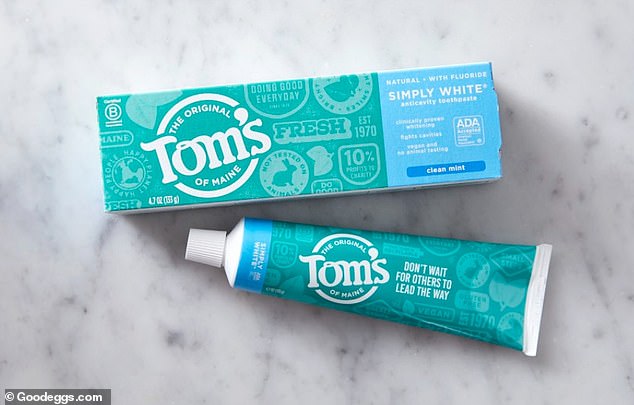Water used to contaminate Tom’s of Maine toothpaste with bacteria and mold
A popular toothpaste product from the all-natural (I THINK WE CAN CALL IT THIS?) Maine hygiene company Tom’s was found to be made with water containing dangerous bacteria.
Colgate-Palmolive-owned Tom’s of Maine toothpaste was manufactured with water found to contain three different potentially dangerous bacteria, while a mold-like substance was found in the manufacturing facility.
A warning letter from the FDA stated that Tom’s Simply White Clean Mint toothpaste, which sells for $6, contained Pseudomonas aeruginosa and a “black mold-like substance” at the company’s manufacturing facility in Sanford, Maine, primarily around water tanks and production equipment.
FDA investigators also found Ralstonia insidiosa, a different type of bacteria, in water sources at the Sanford, Maine, plant.
A second Tom’s product, the Wicked Cool! Anticavity Toothpaste was found to contain the deadly bacterium Paracoccus yeei.
P. aeruginosa is known to cause blood and lung infections, while R. insidiosa infection is often associated with hospital settings and can lead to infections in the bloodstream, lungs, wounds or surgical sites, and the urinary tract. And P. yeei is known to cause peritonitis and conjunctivitis.
The FDA inspection of the facility was conducted in May.
The agency said in its letter to Tom’s: ‘Water is a key ingredient in many of your over-the-counter medicines. It is essential that you use a water system that is designed to be robust, and that you effectively control, maintain and monitor the system to ensure that it consistently produces water suitable for pharmaceutical use.”
Tom’s of Maine makes a wide range of personal care products, from shampoo and toothpaste to deodorant. The company states on its website that it prides itself on using “safe” and “hard-working” ingredients.
The natural ingredients of various products are touted as being safe and free of chemicals.
FDA inspectors visited the Tom’s of Maine plant in Sanford and found inadequate water system controls, failure to maintain proper sanitary conditions and poor handling of product complaints. Mold-like substances were found to be present near production equipment
For its part, the company said: ‘We have always tested finished products before they leave our control, and we remain fully confident in the safety and quality of the toothpaste we make.
“In addition, we have retained water specialists to evaluate our systems in Sanford, we have implemented additional safety measures to ensure compliance with FDA standards, and our water testing shows no issues.”
Despite Findings of FDA inspectorsthere has been no product recall. The FDA has also asked Tom’s owner, Colgate-Palmolive, to provide additional documentation of its manufacturing operations with a “thorough review of all microbiological hazards” and to submit the results of those tests.
The FDA is required to inspect manufacturing facilities of over-the-counter cosmetics and medications to ensure they follow current good manufacturing practices.
There is no indication that the FDA initiated the inspection for any reason other than it being a routine requirement.
The FDA still believes the products are safe, but has not issued a recall for any of these products.
The FDA specifically found that the facility violated current good manufacturing practices by failing to prevent potentially hazardous microorganisms in water samples used in product manufacturing and equipment cleaning.
The agency’s inspectors also found that the water system used in production and cleaning did not meet antimicrobial specifications.
The facility was found to have a black mold-like substance and powder residue in the areas where the products were made. It is possible that mold spores, which travel through the air, have landed on damp equipment.
And customer complaints about the smell, color or taste of the products have not been investigated.

Tom’s of Maine’s Sanford plant is still open, but the company will be required to submit a corrective action plan to the FDA. There are no indications that anyone has become ill
The facility is not closed. Instead, the agency requires the company to submit a detailed corrective action plan, including an assessment of health hazards and possible necessary product recalls.
There is no evidence that anyone has become ill from any of these pathogens, but if one were to infect someone, the consequences could be serious.
Pseudomonas aeruginosa, a leading cause of infections acquired in hospitals, can be serious depending on how the disease enters the body.
On the mild side, this can lead to conditions such as swimmer’s ear (otitis externa), especially if the bacteria enter the ear through contaminated toothpaste or hands. This is usually a treatable infection and causes symptoms such as ear pain and discomfort.
On the more serious side, Pseudomonas, especially in individuals with weakened immune systems, can lead to serious infections such as pneumonia, bloodstream infections (sepsis), or bone infections (osteomyelitis). These infections can spread quickly and can cause systemic symptoms such as fever, chills, confusion and shock.
While healthy individuals are less likely to develop serious infections, people with compromised immune systems or open wounds are generally more vulnerable to the harmful effects of disease.
Ralstonia insidiosa is generally dangerous to people with weak immune systems and is usually acquired in hospitals. It can lead to infections in the bloodstream, lungs, wounds or surgical sites, and the urinary tract.
It is usually resistant to antibiotics, making the infection difficult to treat.
And Paracoccus yeei also causes rare infections in people with compromised immune systems and has been linked to a variety of infections, including at wound sites, the bloodstream and the respiratory system, with patients often requiring ventilator support.
